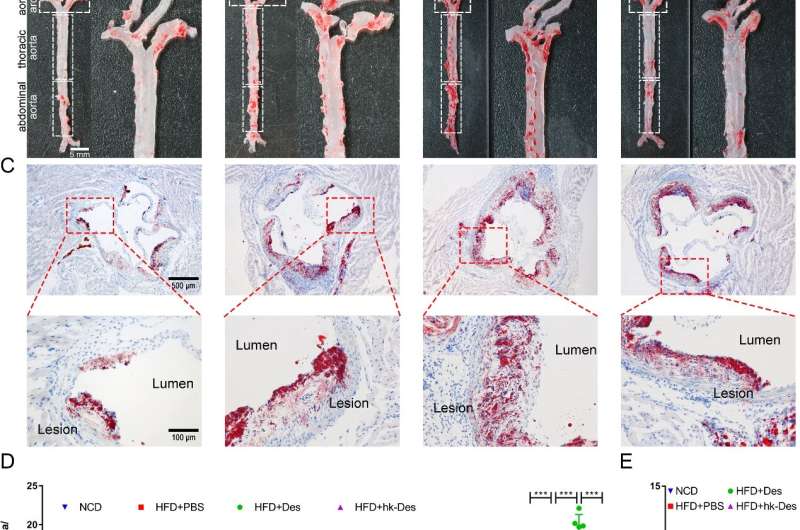This article has been reviewed according to Science X's editorial process and policies. Editors have highlighted the following attributes while ensuring the content's credibility:
fact-checked
proofread
Gut bacteria Desulfovibrio desulfuricans found to accelerate progression of atherosclerosis

In the past few years, increasing evidence has pointed towards gut microbiota's critical role in influencing human health and diseases, including atherosclerosis. This led scientists to dive deeper into studying gut microbiota-host interactions.
However, the roles of many gut bacteria in the development of atherosclerosis are still unclear because the gut microbiota constitute a complex consortium of microbial species and strains and have intricate interaction with the host immune system.
Among these microbes is D. desulfuricans, an anaerobic bacterium found to be prevalent in patients with conditions such as ulcerative colitis and type 2 diabetes, and implicated in inflammatory bowel diseases, liver abscesses, and appendicitis. Until now, its connection with atherosclerosis remained unknown.
To decode this correlation, the researchers employed a modified version of the traditional Linear Discriminant Analysis (LDA) method known as M-LDA. Unlike the conventional LDA method that scores original features only in the first dimensional projection direction of the LDA space, M-LDA evaluates features across all divisible projection directions in the LDA space, thus increasing the accuracy of the evaluation.
Applying this technique on atherosclerotic and non-atherosclerotic mice, researchers observed an increase in D. desulfuricans abundance in Apoe−/− mice subjected to a high-fat diet. Furthermore, administration of D. desulfuricans aggravated the development of atherosclerotic lesions in these mice, demonstrating a clear link between the gut bacterium and atherosclerosis.
A closer examination revealed the bacterium's role in increasing intestinal permeability. It significantly decreased the number of goblet cells in the gut, inhibited the synthesis and secretion of mucins that form the protective mucus barrier. It also downregulated the expression of two tight junction proteins—ZO-1 and Occludin, which serve as barriers to the transepithelial influx of noxious substances/microorganisms from the gut lumen.
The decline of these protective mechanisms resulted in an elevated transition of lipopolysaccharide (LPS), a potent endotoxin, into the bloodstream, triggering systemic inflammation. The presence of LPS in the blood initiated a cascade of inflammatory responses, principally through the activation of the Toll-like receptor 4 (TLR4)/nuclear factor-κB (NF-κB) signaling pathway.
This pathway is crucial to the development of atherosclerosis. It's noteworthy that the use of TAK-242, a specific inhibitor of TLR4, can ameliorate the development of D. desulfuricans-induced atherosclerosis by blocking the LPS-induced activation of TLR4/NF-κB signaling.
These findings mark a significant leap in our understanding of the mechanisms driving atherosclerosis. They highlight the critical role of D. desulfuricans and the gut microbiota in the development of atherosclerosis, showing how changes in intestinal permeability and activation of inflammatory pathways can accelerate the disease's progression.
Researchers believe these insights pave the way for new therapeutic strategies that could improve the prognosis of patients with atherosclerosis and other associated cardiovascular diseases. They hope to further explore the possibilities of manipulating gut microbiota or developing strategies to counteract the deleterious effects of D. desulfuricans as a novel approach to preventing and treating these conditions.
The work is published in the journal Genes & Diseases.
More information: Kun Zhang et al, Desulfovibrio desulfuricans aggravates atherosclerosis by enhancing intestinal permeability and endothelial TLR4/NF-κB pathway in Apoe mice, Genes & Diseases (2021). DOI: 10.1016/j.gendis.2021.09.007





















